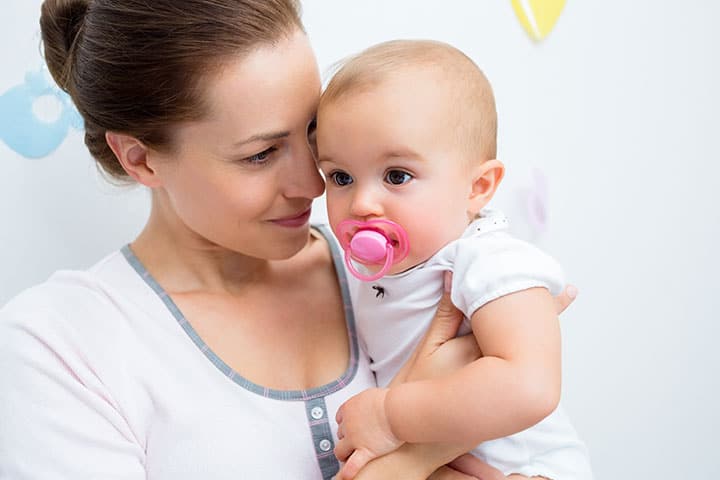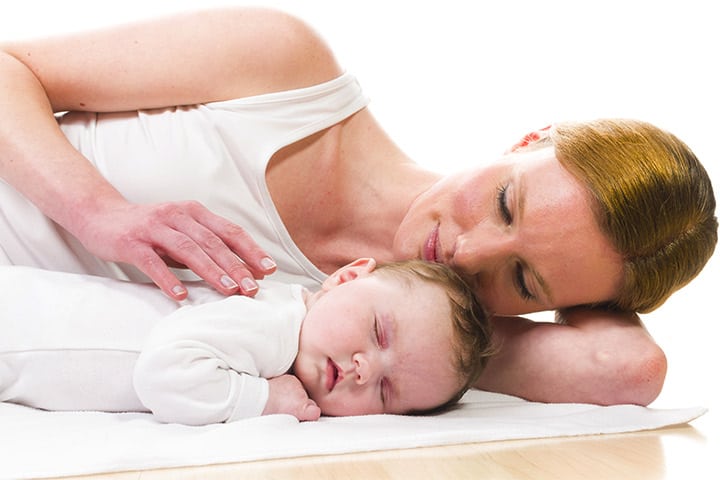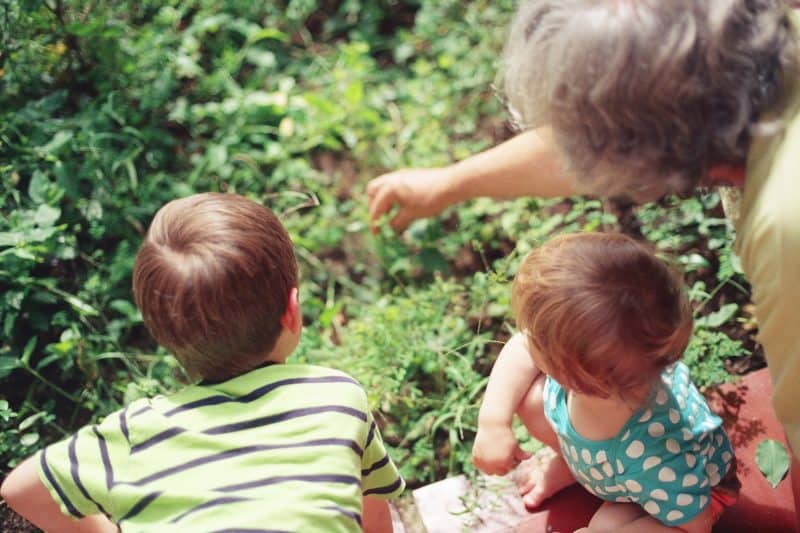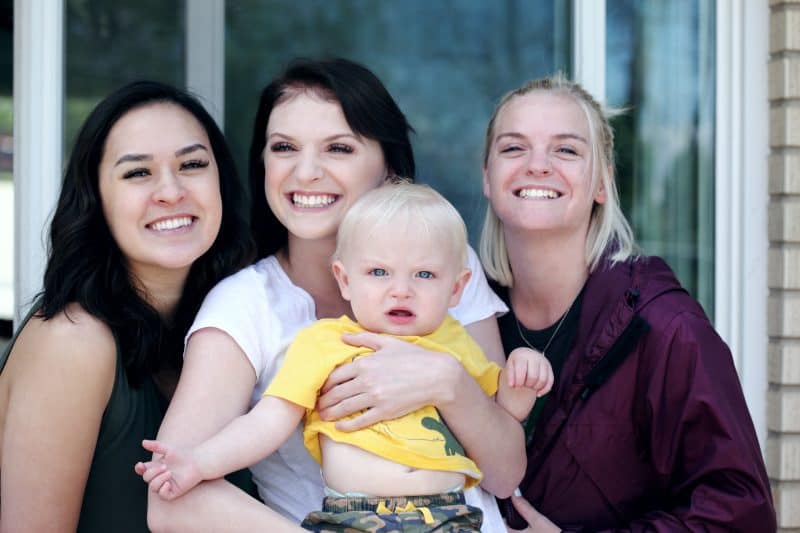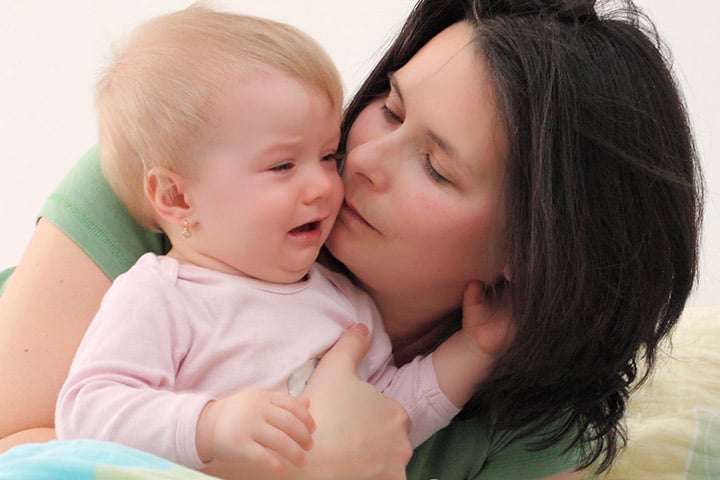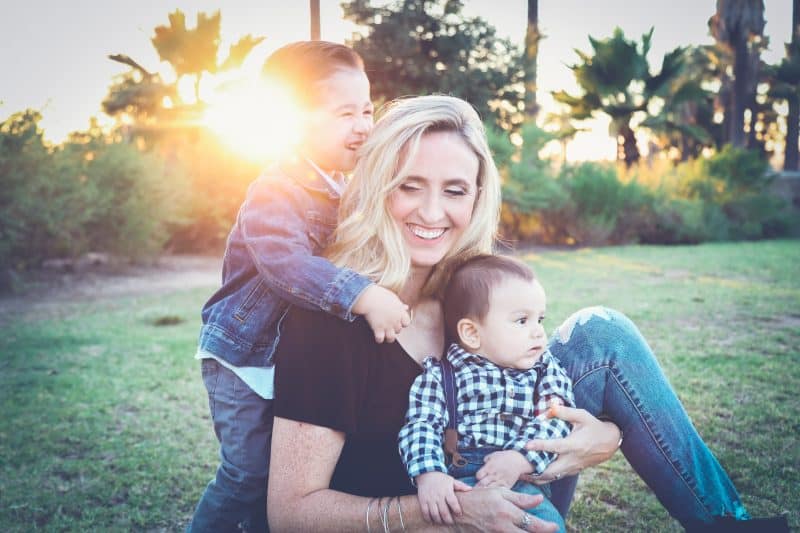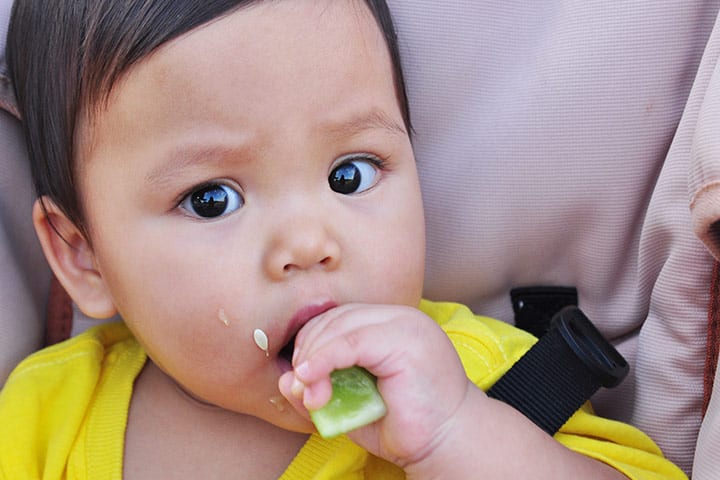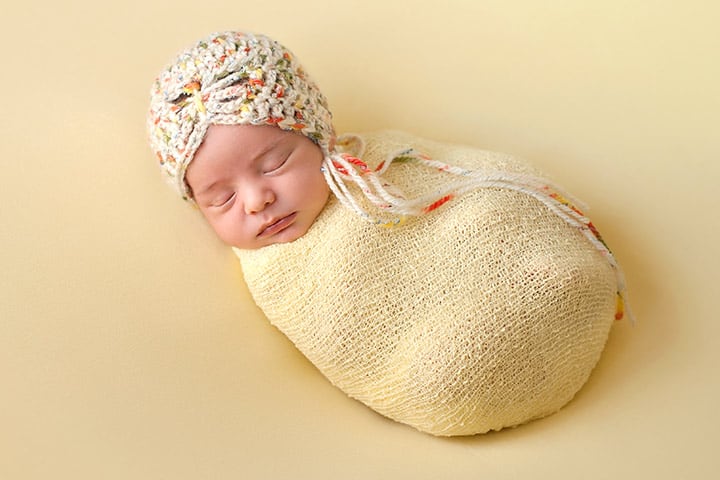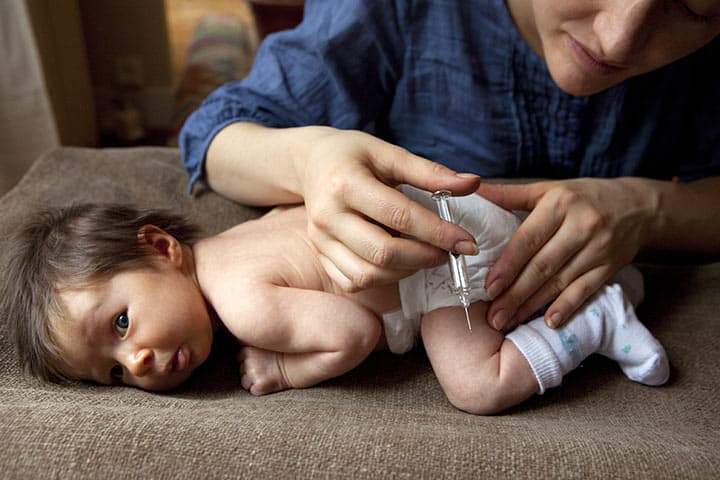Is your baby suffering from constant cough? Does she show obvious signs of discomfort and distress without any specific reason? Then she may be suffering from dry cough. This post talks about dry cough in babies, and what you, as a parent, can do to treat it. Keep reading to know more.
What Is A Dry Cough?
A dry cough, as the name suggests, is a type of a cough in which there is no mucus release, or phlegm or sputum, along with the cough. If your baby has a dry cough, you will notice a sudden cough, in which there is a loud noise along with the release of air from the lungs. A dry cough may be a signal that there is some underlying condition that could range from mild to severe and needs urgent care and attention.
Understanding Dry Cough In Babies:
Your baby may be suffering from a cough due to varied reasons. At this tender age, your baby’s system is too sensitive, and it is quite easy for him to get affected by allergens and irritants, which may lead to a cough or even dry cough.
When your baby has dry cough, it can turn into an uncomfortable and often painful situation, where you feel helpless and want to help your baby as soon as you can. In some cases, especially if the coughing is persistent or is severe, it may also cause interference with your baby’s daily routine, including feeding and sleeping. In such cases, not only does your baby suffer from a cough, but there is also the chance that your baby might become extremely irritable and cranky.
When your baby has a cough, it means that your baby’s body is trying to protect itself from outside influences and foreign bodies. Coughing will help your baby’s body to keep the air passage clear and to remove any traces of irritants from the body. When your baby has a dry cough, it is often a result of a recent cold or an allergy. It is also a way for your baby’s body to clear any remains of irritants in the case of a sore throat and to also remove the last remaining traces of a postnasal drip.
Causes Of Dry Cough In Babies:
If your baby has a dry cough, it can often be persistent and painful, as well as exert a certain amount of pressure or force from your baby. While there are many reasons that could cause the dry cough, the effects could range from mild to severe. To understand what could be the underlying reason, here are a few common causes that could have led to dry cough in baby:
1. Common Cold:
- Your baby’s dry cough is never the first step that occurs in the cold and cough condition. In fact, a dry cough will often be one of the last stages of cold and cough that your baby may have suffered from, even though it may be more audible and difficult to go through.
- The common cold that most babies suffer from is a type of viral infection. It affects your baby’s respiratory system, and it begins as a slight irritation or tickly feeling in the throat.
- As your baby experiences the progression of the cold, you will notice that the coughing get a wet feel to it, often because of the mucus that accompanies it. While this cold will take a few days to ease out, as it reaches its end after a few days, you will notice that there is a lack of mucus that was earlier accompanying the cough.
- At this stage, the cough that began as a regular common cold in your baby will take on the symptoms of a dry cough.
2. Influenza:
- In some cases, the influenza virus can also cause certain symptoms that are exactly similar to those of a cold. As your baby is small, the symptoms will be much severe.
- Just as in the case of the common cold, influenza begins as a dry and hoarse type of coughing.
- As your baby’s condition will start to improve, you will notice the appearance of phlegm along with the cough.
3. Environmental Irritants:
- Your baby is also sensitive and may react more easily and fast, as well in a more severe way, to irritants that are present around.
- For instance, environmental irritants are something that both you and your baby will be exposed to, as you are both in the same environment, but it will always affect your baby more than you.
- There are various environmental irritants that could result in a dry cough in your baby. Some of the most common culprits are tobacco smoke, a dry and hot climate or the presence of strong odors from chemicals. Such environmental irritants can make your baby’s throat go dry and itchy and result in a coughing fit that will also be dry.
4. Gastroesophageal Reflux Disease:
- Gastroesophageal reflux disease or GRD is a common condition that affects infants and babies.
- In gastroesophageal reflux disease, the contents of the stomach, including the various acids of the stomach, come back up towards the esophagus, instead of staying in the stomach. When this happens, it causes a kind of burning sensation in the throat and respiratory tract of your baby. The reflux will often make your baby spit up and in severe cases can also lead to vomiting.
- When the acids or the contents of the stomach come up to your baby’s esophagus and reach the throat, it can irritate your baby’s sensitive throat. In such a situation, your baby will get affected with a dry kind of a cough that may be quite persistent and will often have no other accompanying symptom or illness.
5. Pertussis Or Whooping Cough:
- The common name for pertussis is whooping cough, which is another common condition to affect babies. It is a type of bacterial infection that occurs in the baby’s respiratory tract and is extremely contagious.
- If your baby is affected with pertussis or a whooping cough, you will notice a rather strong, persistent and forceful type of coughing. Your baby will also make a very distinct sound while breathing in, which will sound like a ‘whoosh.’
- The cough that accompanies a whooping cough is extremely dry and can pose the threat of choking in a small baby.
- In some cases, especially if the coughing is too dry, forceful or persistent, it can also lead to other symptoms. Some common symptoms that your baby will exhibit are tears in the eyes which will be a result of the force that the coughing exerts, bluish tint to the eyes and the tongue protruding out (1).
How To Treat Dry Cough In Babies?
The treatment for dry baby cough will depend on the cause (2). A dry cough affects different babies in many ways, and the causes also vary. To make sure that your baby gets the right treatment, you have to ensure that you and your baby’s doctor can determine the exact cause of the condition. Depending on what the reason for the dry cough is, here are a few possible treatment options that your doctor may suggest for your baby:
1. Dry Cough Due To Common Cold:
- If the reason for your baby’s dry cough is common cold, one of the most effective ways to treat is to use some home treatments for alleviating the condition (read the section on home treatments below).
2. Dry Cough Due To Influenza:
- It is understandable that you may be tempted to help your baby get better in the best and quickest way. However, it is important that you try and avoid the use of antibiotics for your baby, unless necessary.
- In most cases, unless the symptoms are too severe or have been going on for too many days, your baby’s doctor will advise a simple treatment of rest and healthy eating.
- It is also important to hydrate your baby, so make sure that you give him enough fluids. If you are still breastfeeding your baby, continue doing so. Alternatively, if your baby has begun to wean, you may include fresh fruit juices as well as warm homemade soups.
3. Dry Cough Due To Environmental Irritants:
- The best way to protect your baby from dry cough that occurs as a result of environmental irritants is to keep your baby away from the same.
- If you live in a cold area or if it is winter, the air can become particularly dry and hot in case you are using artificial modes of heat in the house. Prevent the air from becoming too hot and dry use a cool mist humidifier in the room where your baby sleeps or spends most of the time. Remember that germs, mold, and bacteria can thrive in the moist environment of the filters of the humidifiers, so it is important that you clean them regularly. Alternatively, you can insert a fresh filter before each use.
- If the weather is not too cold, open the windows to allow fresh air to come in as it will make the room less stuffy. In case you do not have the option of opening a window, you can also switch on a fan that will help to circulate the air.
- If someone in your family is a smoker, ask them not to smoke in the house, as residual smoke can lead to dry cough in your baby. Also, if they are going out of the house to smoke, ask them not to smoke near any door or window of the house, as the smoke from the cigarette can still enter the house and cause a reaction in your baby.
- Do not use any room fresheners, perfumes, deodorants or other such sprays that can leave behind a residue in the air and lead to a dry cough in your baby.
- Dress your baby in loose, comfortable and preferably cotton clothes, if the weather permits. A dry cough will exert a lot of pressure on your little one and may make your baby heave and sweat. Wearing loose clothes that allow circulation of air and also absorb sweat will help your baby feel more comfortable than wearing tight clothes or clothes that can increase your baby’s body temperature.
4. Dry Cough Due To Gastroesophageal Reflux Disease:
- To treat gastroesophageal reflux disease or GRD, your baby’s doctor will first examine your baby and then prescribe certain medications that will help combat and prevent the same.
- Even though there are some over the counter drugs available that can help to treat gastroesophageal reflux disease in babies, it is important that you first speak to your baby’s doctor and only then decide on any dry cough medicine for baby.
5. Dry Cough Due To Pertussis Or Whooping Cough:
- If your baby has a dry cough due to pertussis or whooping cough, your baby’s doctor will most likely prescribe a course of antibiotics to help treat the same. In most cases, your baby will be given the antibiotic intravenously, through the veins as a drip (2).
- If your baby is less than a year old, the doctor may recommend hospitalization, as it will help to keep your baby safe against any possible chances of any arising complication.
- Also, the dry cough that occurs as a result of a whooping cough is extremely persistent and also poses the risk of choking in babies. Staying in the hospital will ensure that your baby is under constant medical supervision and will get immediate medical care in case it is needed.
- As a whooping cough is an extremely contagious condition, your baby will most likely be kept in isolation to prevent the risk of infection to other babies.
- In case the condition is severe, your baby’s doctor will treat your baby with the corticosteroid medication that will help to reduce any inflammation in your baby’s air path. It will also make it easier for your baby to breathe and will reduce or prevent the risk of choking. It is likely that your baby’s doctor will give the corticosteroid medication as an intravenous treatment, the same way as the antibiotics.
- In some cases, it can get extremely difficult for babies to breathe when they have a dry cough due to pertussis or a whooping cough. If your baby is finding it difficult to breathe, the doctor may assist your baby’s breathing with the help of a face mask that will provide extra oxygen for your little one.
- Alternatively, your baby’s doctor may suggest you use a bulb syringe. A bulb syringe is a small device that can be held in the hand and will help to suck the mucus out of your baby’s nose.
Tips To Keep Your Baby Comfortable While Suffering From A Dry Cough:
While your baby is suffering from a dry cough, it can be quite difficult to continue with the regular feeding and sleeping routine that your baby may otherwise have been used to. Here are a few tips that will help you ease your baby’s discomfort:
Try and keep your baby well hydrated. While your baby is sick, the biggest source of comfort for your little one, if you have not weaned your baby yet, is your breast. Let your baby feed as many times as possible. Hold your baby closely in your arms and help to make your little one comfortable. Offer your breast as many times as your baby wants. Staying hydrated will help to prevent further dryness in your baby’s airways and will help him get better faster.
Falling asleep while suffering from a dry cough can be close to an impossible situation. You can help your baby sleep by making the environment a little sleep friendly. Close the curtains and cancel out any noise. Make the room as dim as possible and ask all your family members to be quiet or keep the volume low. Keep your baby dressed in loose and comfortable clothes that are ideal for sleep time and keep the bed or baby cot comfortable and clean.
You can rock or pat your baby to sleep while holding your baby in your arms or lie down with your baby for a feed and nurse your little one to sleep. While your baby is sleeping, make sure you stay around and monitor your little one. Dry coughing can increase the risk of choking, so it is important that you do not leave your baby unattended at any times, even if your baby is safely sleeping in the baby cot. Stay around and in case your baby wakes up coughing, pick up your little one in your arms and gently pat the back.
Home Remedies For Dry Cough In Babies:
If you have noticed your baby with dry cough, you may try these safe home remedies that are also known to be effective. Of course it is important that you first speak to your baby’s doctor and check all the ingredients that are used, to know if you can give them to your baby or not. Once your baby’s doctor gives you the go-ahead, you can try the applicable home remedy for your little one. In case you give your baby the home remedy for a dry cough but cannot notice any change in the symptoms, or if your baby’s condition seems to worsen, speak to your baby’s doctor about it and get a medical assessment if required. Here are some home remedies that can help soothe dry cough for baby:
1. If Your Baby Is Younger Than Six Months:
Breast Milk:
- Breast milk is one of the best sources of treatment for your baby’s dry cough and is usually all that your baby will need as a home remedy to get better.
- Your breast milk is full of antibodies that will keep your baby strong and will help your little one fight against infection and germs.
2. If Your Baby Is Older Than Six Months:
Cumin Water:
You Need:
- 1 to 2 tsp of cumin seeds
- Water
How To:
- Add some water in a pan and set it to boil.
- Once the water starts to boil, add the cumin seeds. Let it boil for a few minutes and remove from heat once done. Set it aside to cool.
- Test the water to see that it is completely warm. Now strain the water and discard the cumin seeds. Let your baby sip on the warm cumin water at regular intervals.
3. If Your Baby Is Older Than Ten Months:
Herbal Mix Water:
You Will Need:
- A 1-inch piece of long pepper
- A 1-inch piece of Indian ginger or snap ginger
- 1 betel leaf
- ¼thtsp of black pepper
- ½ tsp of jaggery or as per taste
- 1 glass of water
How To:
- Add all the above ingredients, except the water, in a pestle and mortar, or in a food processor, and crush them to a coarse texture.
- Add the water in a pan and put the crushed ingredients in it. Now bring the water to boil and keep boiling it till it reduces to half of the original quantity.
- Remove from heat and set it aside to cool.
- Once it is warm, strain the water and let your baby sip on it at regular intervals.
A dry cough is not a condition that you should take lightly, as it can cause a lot of discomfort to your baby and also lead to other complications. Speak to your baby’s doctor and find out the best way to take care of your little one.
Has your baby ever suffered from a dry cough? Did you try to treat it at home or did your doctor suggest any medication? Do share your experiences about what worked best for your baby, as it can help other moms too. Leave your comment below.





